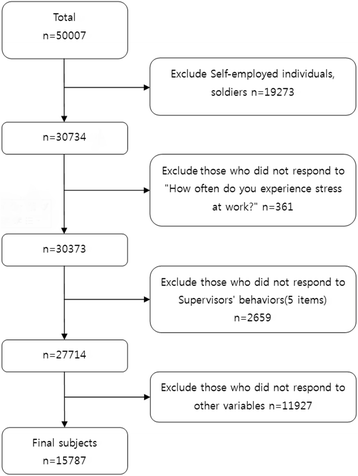Association between supervisors' behavior and wage workers' job stress in Korea: analysis of the fourth Korean working conditions survey
- PMID: 29046811
- PMCID: PMC5635532
- DOI: 10.1186/s40557-017-0199-3
Association between supervisors' behavior and wage workers' job stress in Korea: analysis of the fourth Korean working conditions survey
Abstract
Background: In modern society, many workers are stressed. Supervisors' support or behavior can affect the emotional or psychological part of the worker. The purpose of this study is to investigate the effect of supervisor's behavior on worker's stress.
Methods: The study included 19,272 subjects following the assignment of weighted values to workers other than soldiers using data from the Fourth Korean Working Condition Survey. Supervisors' behavior was measured using 5 items: "supervisor feedback regarding work," "respectful attitude," "good conflict-resolution ability," "good work-related planning and organizational ability," and the encouragement of participation in important decision making. Job stress was measured using 1 item: "I experience stress at work." Multiple logistic regression analysis was performed to examine the effects of supervisors' behavioral, general, occupational, and psychosocial characteristics on job stress in workers. Organizational characteristics associated with supervisors' behavior were also analyzed.
Results: The results showed that supervisors' provision of feedback regarding work increased workers' job stress (OR = 1.329, 95% CI = 1.203 ~ 1.468). When a supervisor respect workers (OR = 0.812, 95% CI = 0.722 ~ 0.913) or good at planning and organizing works (OR = 0.816, 95% CI: 0.732 ~ 0.910), workers' job stress decreased. In particular, the two types of supervisor behaviors, other than feedback regarding work, were high in private-sector organizations employing less than 300 employees.
Conclusion: Supervisors' behavior influenced job stress levels in workers. Therefore, it is necessary to increase education regarding the effects of supervisors' behavior on job stress, which should initially be provided in private-sector organizations with up to 300 employees.
Keywords: Feedback; Job stress; Korean Working Conditions Survey; Supervisor behavior.
Conflict of interest statement
Ethics approval and consent to participate
Not applicable.
Consent for publication
Not applicable.
Competing interests
The authors declare that they have no competing interests.
Publisher’s Note
Springer Nature remains neutral with regard to jurisdictional claims in published maps and institutional affiliations.
Figures
Similar articles
-
Supervisors' perceptions of organizational policies are associated with their likelihood to accommodate back-injured workers.Disabil Rehabil. 2017 Feb;39(4):346-353. doi: 10.3109/09638288.2016.1141245. Epub 2016 Feb 17. Disabil Rehabil. 2017. PMID: 26883582 Free PMC article.
-
The association between quality of direct supervisor's behavior and depressive mood in Korean wage workers: the 4th Korean Working Conditions Survey.Ann Occup Environ Med. 2019 Aug 7;31:e16. doi: 10.35371/aoem.2019.31.e16. eCollection 2019. Ann Occup Environ Med. 2019. PMID: 31620293 Free PMC article.
-
The association between direct supervisor's behavior and employee presenteeism in Korean wage workers: findings from the fifth Korean Working Condition Survey.Ann Occup Environ Med. 2021 Sep 24;33:e30. doi: 10.35371/aoem.2021.33.e30. eCollection 2021. Ann Occup Environ Med. 2021. PMID: 34868600 Free PMC article.
-
Development of an evidence-based guideline for supervisor training in promoting mental health: literature review.J Occup Health. 2011;53(1):1-9. doi: 10.1539/joh.r10002. Epub 2010 Nov 10. J Occup Health. 2011. PMID: 21079372 Review.
-
The significance of nurse supervisors' different ethical decision-making styles.J Nurs Manag. 2006 Nov;14(8):637-43. doi: 10.1111/j.1365-2934.2006.00710.x. J Nurs Manag. 2006. PMID: 17054737 Review.
Cited by
-
Need for Recovery and Work-Family Conflict in the Armed Forces: A Latent Profile Analysis of Job Demands and Resources.Int J Environ Res Public Health. 2025 May 18;22(5):795. doi: 10.3390/ijerph22050795. Int J Environ Res Public Health. 2025. PMID: 40427909 Free PMC article.
References
-
- Yang LQ, Caughlin DE. Aggression-preventive supervisor behavior: Implications for workplace climate and employee outcomes. J Occup Health Psychol. 2017;221:1–18. - PubMed
-
- Chandra T, Priyono P. The Influence of Leadership Styles, Work Environment and Job Satisfaction of Employee Performance—Studies in the School of SMPN 10 Surabaya. Int Educ Stud. 2015;91:131. doi: 10.5539/ies.v9n1p131. - DOI
-
- Zhou Q, Martinez LF, Ferreira AI, Rodrigues P. Supervisor support, role ambiguity and productivity associated with presenteeism: A longitudinal study. J Bus Res. 2016;699:3380–3387. doi: 10.1016/j.jbusres.2016.02.006. - DOI
-
- Solaja M, Idowu E, James E. Exploring the relationship between leadership communication style, personality trait and organizational productivity. Serbian Journal of Management. 2016;111:99–117. doi: 10.5937/sjm11-8480. - DOI
-
- Mathisen GE, Einarsen S, Mykletun R. The Relationship Between Supervisor Personality, Supervisors’ Perceived Stress and Workplace Bullying. J Bus Ethics. 2010;994:637–651.
LinkOut - more resources
Full Text Sources
Other Literature Sources


